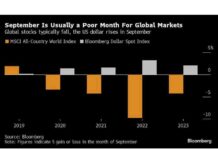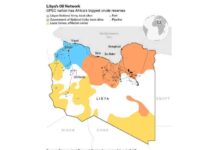Australian Prime Minister Anthony Albanese concluded his visit to the US with confidence in the stability and longevity of two crucial regional security alliances, Aukus and the Quad, regardless of the outcome of the upcoming presidential election. The Aukus security alliance, formed with the UK, was a focal point of discussions during Albanese’s meeting with President Joe Biden in Wilmington, Delaware. The following day, Albanese joined Prime Ministers Narendra Modi of India and Fumio Kishida of Japan at the annual Quadrilateral Security Dialogue leaders summit.
Amid uncertainty surrounding the future of these alliances post-election, Albanese expressed optimism in their continuity. Despite Republican presidential nominee Donald Trump’s historical skepticism towards US alliances, Albanese remains confident in the enduring support for Aukus across various political spectrums in the US. He stated, “There is no question in my mind that Aukus will continue to have the support of any future US administration.”
In a significant development, the three Aukus members indicated their willingness to explore the expansion of the agreement by involving additional partners such as Canada, South Korea, and New Zealand. They also expressed interest in collaborating with Japan on research and development of critical technologies. This move underscores the commitment of Aukus members to strengthening regional security and cooperation.
Similarly, the Quad leaders announced a joint initiative to address health challenges, focusing initially on combating cervical cancer. Additionally, they outlined enhancements to maritime security, including the implementation of an observer program across coast guard services to enhance interoperability. These collaborative efforts reflect the shared commitment of Quad nations to promoting regional stability and addressing common challenges.
Albanese reiterated his confidence in the longevity of the Quad alliance, emphasizing the dedication of all four nations to its success. President Biden echoed this sentiment, emphasizing that the Quad “will survive way beyond November.” The commitment of both leaders to the sustainability of these alliances underscores the importance of regional cooperation in addressing security and health challenges.
As the global geopolitical landscape continues to evolve, the resilience of alliances such as Aukus and the Quad becomes increasingly vital. The commitment of member nations to collaboration, innovation, and mutual support is a testament to the enduring strength of these alliances in promoting peace, security, and prosperity in the Indo-Pacific region and beyond.
Impact of Aukus and Quad Alliances
The Aukus and Quad alliances play a crucial role in shaping regional security dynamics and fostering cooperation among like-minded nations. By strengthening defense ties, promoting technological innovation, and addressing common challenges, these alliances contribute to the stability and prosperity of the region.
The Aukus alliance, formed between Australia, the UK, and the US, focuses on enhancing security cooperation and technological development in the Indo-Pacific region. The recent discussions on potentially expanding the partnership to include additional countries underscore the commitment of member nations to deepening collaboration and addressing emerging security threats.
On the other hand, the Quad alliance, comprising Australia, India, Japan, and the US, aims to promote a free, open, and inclusive Indo-Pacific region. Through joint initiatives on health, maritime security, and other areas of cooperation, the Quad nations demonstrate their shared commitment to upholding shared values and interests in the region.
Future Prospects and Challenges
While the Aukus and Quad alliances have shown resilience and adaptability in the face of evolving security challenges, they also face certain risks and uncertainties. The upcoming US presidential election, changes in leadership dynamics, and shifting geopolitical dynamics could impact the future trajectory of these alliances.
However, the confidence expressed by Prime Minister Albanese and President Biden in the enduring nature of these alliances signals a strong commitment to maintaining regional security and cooperation. By addressing common challenges, expanding partnerships, and enhancing interoperability, the Aukus and Quad alliances are well-positioned to navigate future uncertainties and continue contributing to regional stability.
Conclusion
In conclusion, the confidence expressed by Australian Prime Minister Anthony Albanese in the resilience and longevity of the Aukus and Quad alliances underscores the importance of regional security cooperation in the Indo-Pacific region. As these alliances navigate evolving geopolitical dynamics and address emerging challenges, their commitment to collaboration, innovation, and mutual support will be instrumental in promoting peace, security, and prosperity in the region. By deepening partnerships, expanding initiatives, and enhancing interoperability, the Aukus and Quad alliances are poised to play a pivotal role in shaping the future of regional security and stability.






















